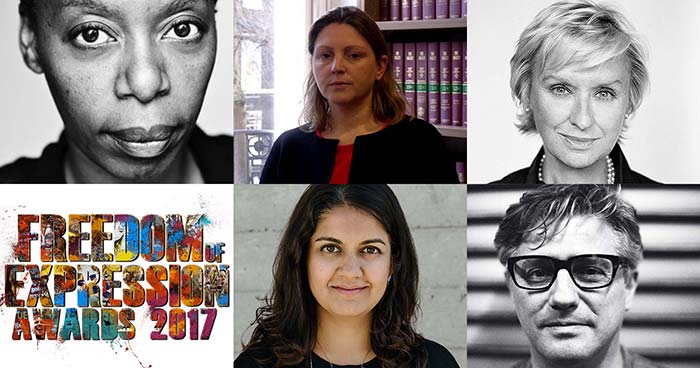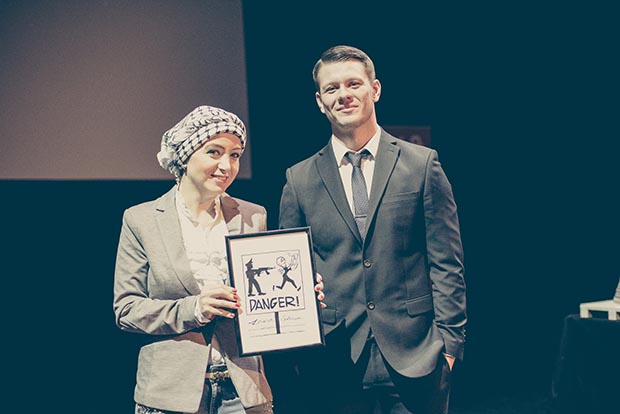13 Dec 2016 | Awards, Press Releases

Harry Potter actor Noma Dumezweni, Doughty Street Chambers lawyer Caiolfhionn Gallagher, former Vanity Fair editor Tina Brown, Superflux co-founder Anab Jain and Heaven 17’s former manager Stephen Budd.
Harry Potter actor Noma Dumezweni will join a panel of judges that also includes Hillsborough lawyer Caiolfhionn Gallagher and former Vanity Fair editor Tina Brown to decide the 2017 Index on Censorship Freedom of Expression Award winners.
The awards, now in their 17th year, honour those at the forefront of challenging censorship in the field of arts, campaigning, journalism and digital advocacy. Many of the winners face regular persecution for their work.
Dumezweni, who plays Hermione in the stage play Harry Potter and the Cursed Child, was shortlisted earlier this year for an Evening Standard Theatre Award for Best Actress. Speaking about the importance of the Index Awards she said: “Freedom of expression is essential to help challenge our perception of the world”.
Caoilfhionn Gallagher is a public law specialist at Doughty Street Chambers who represented the bereaved families in the 7/7 London bombings, and the Hillsborough football stadium tragedy. In October 2016 she was named Human Rights and Public Law Junior of the Year at the Chambers UK Bar Awards.
“Freedom of expression is needed now more than ever, as many governments worldwide are attempting to stifle critical voices. Some do this in ways which are blatant breaches of fundamental freedoms, others’ methods are more subtle but still pose a significant threat to free speech and democracy. Now, more than ever, we must fight to protect and champion freedom of expression,” said Gallagher.
Other judges on the panel include Tina Brown, an award-winning journalist and former editor-in-chief of Tatler, Vanity Fair and The New Yorker; Anab Jain, TED fellow and co-founder of Superflux, a company focused on emerging technologies; and Stephen Budd, chairman of the Music Managers Forum and co-founder of Damon Albarn’s ‘Africa Express’ musical collaborations project.
Announcing the judging panel, Index on Censorship chief executive Jodie Ginsberg said: “No one should be punished for speaking freely — yet across the world we see journalists muzzled for challenging politicians, musicians silenced for questioning the status quo, or cartoonists forced to drop their pens because they mocked the powerful and the corrupt.”
“Our awards celebrate those who fight back. And we’re delighted to have such an impressive panel selecting this year’s winners.”
Previous winners of the Freedom of Expression awards include Nobel Peace Prize winner Malala Yousafzai, Israeli conductor Daniel Barenboim, and Russian journalist Anna Politkovskaya. Hundreds of public nominations are made for the awards each year. Many of those nominated are regularly targeted by authorities or by criminal and extremist groups for their work. Some face regular death threats, others criminal prosecution.
Previous judges include digital campaigner and entrepreneur Martha Lane Fox, Nobel laureate Wole Soyinka, novelist Elif Shafak, journalist and campaigner Mariane Pearl, and human rights lawyer Keir Starmer.
The Freedom of Expression Awards 2017 will be held on April 19 at the Unicorn Theatre.
For more information, please contact Helen Galliano: [email protected].
Notes for editors
Index on Censorship, founded in 1972 by poet Stephen Spender, campaigns for freedom of expression worldwide. Its award-winning quarterly magazine has featured writers such as Vaclav Havel, Nadine Gordimer, Arthur Miller, Philip Pullman, Salman Rushdie, Aung San Suu Kyi and Amartya Sen.
Award winners become Index on Censorship Freedom of Expression Award Fellows and receive training and support for a year after the awards to help them maximise the impact of their work.
29 Nov 2016 | About Index
[vc_row][vc_column][vc_column_text]

2016 Freedom of Expression Journalism Award winner Zaina Erhaim and Jake Hanrahan of Vice News (Photo: Elina Kansikas for Index on Censorship)
“The world is travelling in two directions: one is towards the narrowing of distances through travel, increasing interchange… the other is towards the shutting down of frontiers, the ever more jealous surveillance by governments and police of individual freedom.”
So wrote poet and Index founder Stephen Spender in 1972 – in the very first edition of Index on Censorship magazine. Four decades later, we take the same view as we did then: that faced with those who want to silence us, we must fight so all voices can be heard.
With your help, each year we are able to support more writers, journalists and artists at the free speech front line – wherever they are in the world – through Index Fellowships. These remarkable individuals risk their freedom, their families and even their lives to speak out against injustice, censorship and threats to free expression.
Your donation is needed to provide the bespoke assistance, training and public recognition that these outstanding individuals need to ensure their voices continue to be heard, despite the restrictions under which they are forced to live and work.
Your support will help award winners like Zaina Erhaim, the Syrian journalist who returned to Syria after war broke out to help train female citizen journalists. Index arranged for Zaina to headline at an event with veteran journalist Kate Adie earlier this year and campaigned on Zaina’s behalf after British authorities seized her passport.
“I can’t thank you enough for all the efforts you have put in to help me in the latest crisis. Feeling supported is surely the most effective cure for any problem a Syrian like me might face,” Zaina wrote after departing the UK.[/vc_column_text][/vc_column][/vc_row][vc_row][vc_column][vc_btn title=”Donate to Index on Censorship via your credit card or Paypal account.” color=”danger” size=”lg” align=”center” link=”url:https%3A%2F%2Fwww.indexoncensorship.org%2Fsupport-index-donate-now-annual-appeal%2F|||”][/vc_column][/vc_row]
31 Oct 2016 | Campaigns, Campaigns -- Featured, Statements, Turkey, Turkey Statements
Index on Censorship strongly condemns the recent wave of arrests and forced closures of media outlets in Turkey.
Over the last three days, Turkish authorities have utilised their powers under the state of emergency to shut down 15 pro-Kurdish media outlets and detain 13 journalists.
“The Turkish government’s latest attempt to silence journalists is confirming the ongoing crackdown on media freedom and throws light on the deteriorating environment for free speech in the country. Media outlets covering the Kurdish minority have been repeatedly targeted and these decrees indicate the authorities have no plans to let up the pressure,” Index’s senior advocacy officer, Melody Patry, said.
On 29 October the Turkish government adopted cabinet decrees No. 675 and 676 which ordered the shutdown of 10 pro-Kurdish newspapers, two news agencies and three magazines. The newspapers include: Özgür Gündem, Azadiya Welat, Batman Çağdaş, Cizre Postası, Güney Express, İdil Haber, Kızıltepe’nin Sesi, Prestij Haber, Urfanatik and Yüksekova Haber; The two pro-Kurdish news agencies were Dicle News Agency (DİHA) and Jin News Agency; and the three magazines shut down were Tiroji, Özgürlük Dünyası and Evrensel Kültür.
On 31 October 2016, 13 editors and journalists for independent newspaper Cumhuriyet were detained on terror charges in Istanbul. Those detained include Cumhuriyet editor-in-chief Murat Sabuncu, board executive and columnist Güray Öz, former editor-in-chief of the newspaper Aydın Engin, columnist Hikmet Çetinkaya, the editor-in-chief of the newspaper’s book supplement Turhan Günay, its publications advisor Kadri Gürsel – who is also the head of the International Press Institute’s Turkey office – and accountant Bülent Yener. Cumhuriyet Foundation’s board members Eser Sevinç, Hakan Kara, Musa Kart, Bülent Utku, Mustafa Kemal Güngör, Önder Çelik were also taken into custody.
Detention warrants were also issued for Cumhuriyet Foundation vice president Akın Atalay and board member Nebil Özgentürk, who are both currently out of the country.
Charges against the Cumhuriyet executives include publishing reports that legitimised the coup and management irregularities.
“News of journalists being arrested in Turkey have come in on a nearly daily basis since the start of the state of emergency,” said Hannah Machlin, Index’s project officer for Mapping Media Freedom. “The detentions of Cumhuriyet’s media workers constitute a blatant violation of press freedom that pushes Turkey further away from democratic values.”
Cumhuriyet has continually been harassed by the authorities. The now former editor-in-chief, Can Dundar survived a murder attempt last year and is facing a five-year prison term for “leaking state documents”. Dundar was forced to leave the country following the failed coup and his wife is currently under a travel ban.
With this most recent crackdown, the Platform for Independent Journalism P24 reports that a total of 168 media outlets have been shut down, 99 journalists have been imprisoned and over 2,500 media professionals have lost their jobs since the start of the state of emergency.
11 Oct 2016 | Index in the Press
Free speech advocates have warned about new prosecuting guidelines which open the door to social media users being jailed for “offensive” and “sinister” posts.
Experts from the Index on Censorship and English PEN both voiced unease that moves in the UK to further outlaw offending people online could lead down a dark road. Read the full article


